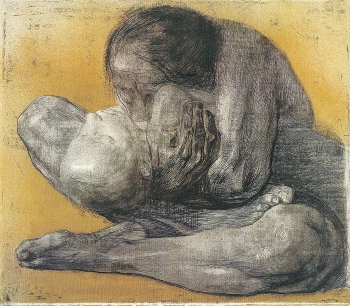 When you talk about your faith story, do you start with sacrifice?
When you talk about your faith story, do you start with sacrifice?
When people ask you about becoming Catholic, does your initial reply focus on sacrifice?
When you describe the Eucharist, do you do include images of sacrifice?
When the first disciples began to tell the story of Jesus, they began by talking about his sacrifice. They didn’t start with his birth or with the miracle stories, as we might tend to do. They started where their faith started; they started with the story of Jesus’s sacrifice—his Passion and death. That is the story the early disciples told over and over.
The death of Jesus is the core story
That story became the bedrock of all the other stories about Jesus. If we were going to make a movie out of the gospels, we would start with the Passion, and then do flashbacks to fill in the rest of the story.
The Passion and death is the only story that is consistent throughout all four gospels. All four gospel writers are writing to different audiences, and they each have different goals. So the stories they put in their “flashbacks” vary. But the story of the Passion is essentially the same in each one.
What we need to understand and make clear for the catechumens is that the way Jesus ultimately revealed God’s love for us was through Jesus’s Passion and death. That can seem a little morbid to newcomers, and even to lifelong Catholics. Why would Jesus’s death be the ultimate revelation of who God is?
To answer that question, we have to enter into the paradox of mystery. Mystery, in the biblical sense, is not a puzzle with a solution. Mystery is a reality that is completely beyond our understanding. Liturgical scholar James Empereur, SJ, says there are three levels of biblical mystery:
It means first of all, the mystery of God, especially the plan of salvation that God has for the world. This is not accessible to human beings and so must be revealed….
To accomplish this plan, God sent God’s son, Jesus Christ. Christ is the key to this mystery. This second level of meaning is the Christ-mystery. In his death and resurrection, the wisdom of God is realized and revealed….
The third level of meaning of mystery is the mystery of Christian liturgy. Mystery here refers here to the sacramental and ritual life of the church…. In the liturgy the death and resurrection are recalled, not as a mere reminder of things past, but in such a way that the saving mystery of Christ is present to the worshippers.
Eucharist was the central place for remembering
This third level, the ritual revelation of the mystery of God, is one reason the Passion story came to be so consistently told.
The Passion story was told every time the church gathered to celebrate the liturgy. This remembering of the story predated the writing of the New Testament. So by the time Matthew, Mark, Luke, John, and Paul were writing about the Last Supper, their telling of the story was already influenced by the ritual of sacrifice they had been celebrating every week for decades.
Jesus is the New Exodus
In the Eucharist, Jesus reframed his own story so that it is still happening today.
The way Jesus reframed his story is very interesting. At the Last Supper, he remembered or memorialized the Exodus story of the Angel of Death passing over the homes of the Israelites and the Israelites passing over the Red Sea into freedom.
But there is a twist. In Jesus’s remembering of the Exodus story, he identified himself as the New Exodus or the New Passover. He took the symbols of Passover and applied them to himself.
The Lamb of God
A primary Passover symbol is the lamb. On the night the Israelites were to escape from Egypt, each family sacrificed a lamb and sprinkled the blood of the lamb on their doorpost as a sign for the Angel of Death to “pass over” that household.
At the Last Supper, Jesus identified himself with the Passover lamb. In the breaking of the bread and the pouring out of the cup, he memorialized both the sacrifice of Passover and the sacrifice he would make on the Cross.
Scholars think that the last meal that Jesus celebrated with his disciples had elements of the Jewish Passover meal, but was not itself a Passover. That is because in John’s gospel, Jesus’s death on the cross coincides with the sacrifice of the Paschal lamb in the temple (Jn 19:31). Perhaps sensing that he would not live to celebrate the Passover, he gathered his disciples to share with them a final meal and to instruct them to associate his sacrifice with God’s plan of salvation, which they all knew as the Passover and Exodus story. Empereur writes:
Through the cross Christians pass from darkness to the light of God, from the death of this world to the resurrection of a future life, from condemnation from sin to freedom of the children of God. In the cross of Christ the glory of God is now made manifest.
What the seekers need to know
Starting with the story of sacrifice might be a challenge for us. However, if we think of the sacrifice mother’s make for their children or the sacrifice we ourselves make for the sake of the poor, that helps gives context to Jesus’s sacrifice. Jesus’s sacrifice is the ultimate revelation of the Father because it is a sacrifice made out of love for us, for our sakes.
Jesus’s sacrifice for us is like a mother’s sacrifice for her child. Jesus gave his body and blood out of love for us. That is the primary thing we want seekers to remember about Jesus. Jesus sacrificed himself out of love for us.








